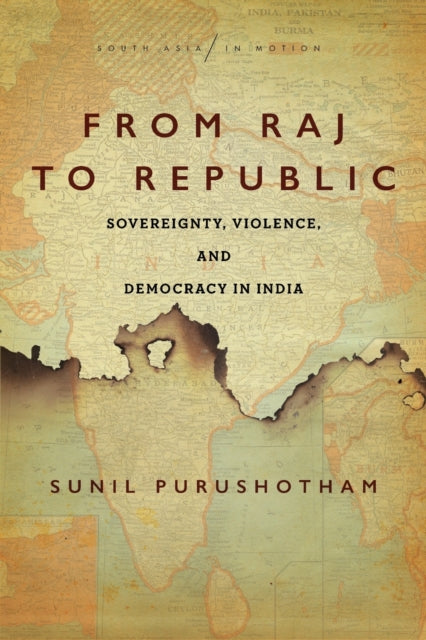Sunil Purushotham
From Raj to Republic: Sovereignty, Violence, and Democracy in India
From Raj to Republic: Sovereignty, Violence, and Democracy in India
YOU SAVE £4.51
- Condition: Brand new
- UK Delivery times: Usually arrives within 2 - 3 working days
- UK Shipping: Fee starts at £2.39. Subject to product weight & dimension
Bulk ordering. Want 15 or more copies? Get a personalised quote and bigger discounts. Learn more about bulk orders.
Couldn't load pickup availability
- More about From Raj to Republic: Sovereignty, Violence, and Democracy in India
Between 1946 and 1952, the British Raj transformed into the Republic of India, the world's largest democracy. This book investigates how violent conjunctures constituted a postcolonial regime of sovereignty and shaped the historical development of democracy in India at the foundational moment of decolonization and national independence.
Format: Paperback / softback
Length: 360 pages
Publication date: 19 January 2021
Publisher: Stanford University Press
Between 1946 and 1952, a remarkable transformation took place as the British Raj, the world's largest colony, transitioned into the Republic of India, the world's largest democracy. This pivotal period witnessed a series of significant events, including independence, the Constituent Assembly Debates, the founding of the Republic, and India's first universal franchise general election. However, these momentous developments occurred amidst the backdrop of immense violence and displacement known as the Partition, which resulted in the division of India into two nations: India and Pakistan.
The uncertain and contested integration of the princely states, as well as the forceful quelling of internal dissent, further complicated the process of nation-building. This book delves into the ways in which these violent conjunctures constituted a postcolonial regime of sovereignty and shaped the historical development of democracy in India at the foundational moment of decolonization and national independence.
To explore this complex history, the book connects three distinct yet interrelated narratives. Firstly, it examines the princely state of Hyderabad's attempt to establish itself as an independent sovereign state. Despite facing opposition from both the British and Indian governments, Hyderabad's leaders persisted in their quest for independence. This struggle ultimately led to the creation of the state of Hyderabad, which remained independent until it was annexed by India in 1948.
Secondly, the book explores the partitioning of Punjab, which was a contentious and traumatic event that marked the division of India into two nations. The partition was based on religious lines, with the majority of Muslims migrating to Pakistan and the majority of Hindus and Sikhs migrating to India. The partition resulted in immense loss of life, displacement, and the creation of refugee camps, which continue to impact the lives of those affected to this day.
Lastly, the book delves into the communist-led revolutionary movement in the southern Indian region of Telangana. This movement was a response to the oppressive rule of the Nizam of Hyderabad and the feudal system that prevailed in the region. The revolutionaries sought to establish a socialist state and to redistribute land and resources to the poor and marginalized. The movement was ultimately successful in overthrowing the Nizam's rule and establishing the state of Telangana as a socialist republic.
Through these three narratives, the book presents a multifaceted history of sovereignty and democracy in India. It highlights the complex and contested nature of India's transition from a colonial to a postcolonial nation, as well as the ways in which historical events and power relations have shaped the country's political and social landscape. The book also sheds light on the ongoing struggles for social justice, equality, and democracy in India, and the challenges that the country continues to face in its quest for a more inclusive and democratic society.
In conclusion, Between 1946 and 1952, the British Raj transformed into the Republic of India, marking a significant milestone in the history of the world's largest democracy. This period was characterized by immense violence and displacement, as well as the uncertain and contested integration of princely states and the forceful quelling of internal dissent. Despite these challenges, India emerged as a nation with a complex and multifaceted history of sovereignty and democracy. This book explores the ways in which these violent conjunctures constituted a postcolonial regime of sovereignty and shaped the historical development of democracy in India at the foundational moment of decolonization and national independence.
Weight: 546g
Dimension: 229 x 151 x 24 (mm)
ISBN-13: 9781503614543
This item can be found in:
UK and International shipping information
UK and International shipping information
UK Delivery and returns information:
- Delivery within 2 - 3 days when ordering in the UK.
- Shipping fee for UK customers from £2.39. Fully tracked shipping service available.
- Returns policy: Return within 30 days of receipt for full refund.
International deliveries:
Shulph Ink now ships to Australia, Belgium, Canada, France, Germany, Ireland, Italy, India, Luxembourg Saudi Arabia, Singapore, Spain, Netherlands, New Zealand, United Arab Emirates, United States of America.
- Delivery times: within 5 - 10 days for international orders.
- Shipping fee: charges vary for overseas orders. Only tracked services are available for most international orders. Some countries have untracked shipping options.
- Customs charges: If ordering to addresses outside the United Kingdom, you may or may not incur additional customs and duties fees during local delivery.


